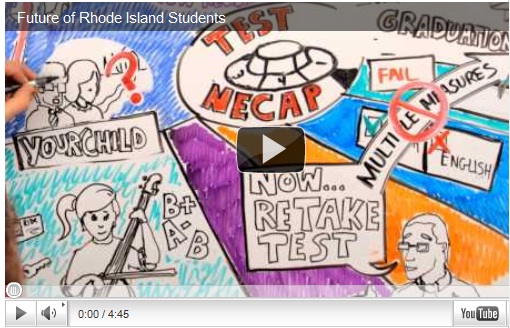In 2012, a proposed change to high school graduation requirements in Rhode Island could mean serious alterations to the future of its students.
If the proposed change passes, students who do not qualify as “partially proficient” on the NECAP would not qualify for graduation. Despite how they performed in school or how many tutoring lessons they took, they would not receive a diploma. According to 2008 regulations, if a student did not achieve “partial proficiency” on the statewide NECAP they could still show proficiency in other ways. The 2012 change would alter this so that if test scores aren’t high enough, students would be required to get tutoring to “sufficiently improve” their score in time for the senior year NECAP retake.
According to a report from The Providence Journal many parents of dedicated students oppose the change because it doesn’t take into account hardworking students with learning disabilities or children who are from schools where the adults have not adequately prepared them for such a high stakes NECAP test. Though many officials believe that the higher stakes will motivate higher school standards and performance, some oppose the change because the regulations are unfair for . Many students from low-income families might not have the means to provide extra tutoring services or support for children who are struggling to gain proficiency by their senior year.
In the , posted above, is a project from individuals who oppose the change to the graduation requirements, the narrator defines the crux of this change as online casino australia a “defining moment” in the future of Rhode Island and “our children’s future.” Using a whiteboard, an artist draws while a narrator entreats the Rhode Island board of regents not to change “Too much, too fast” and to judge students not only by their test results, but by their potential to help the community at large after graduation. They explain that the “current changes proposed by the board of regents may have negative consequences for the very young people they aim to serve”
At minute 3:11 their concerns come to a cap stone. While the whiteboard fills with a swirl of activity, the narrator argues that “math and English alone are not enough to judge our children. There is no focus in this test to skills on career and technology, the arts or humanities. No focus on mentorship or internship, creativity, civic engagement, entrepreneurship or concerns unique to our communities.”
featured photo is a screen capture from
 Free e-Book: 5 Tips to Improve Your Reporting for Standardized Test Reporting
Free e-Book: 5 Tips to Improve Your Reporting for Standardized Test Reporting
Download this eBook from Socrato to learn how to optimize and improve your reports to help students improve their scores on standardize tests such as the SAT, ACT, LSAT or others.











One Response to "The Power of a Single Test on a Child’s Future [VIDEO]"